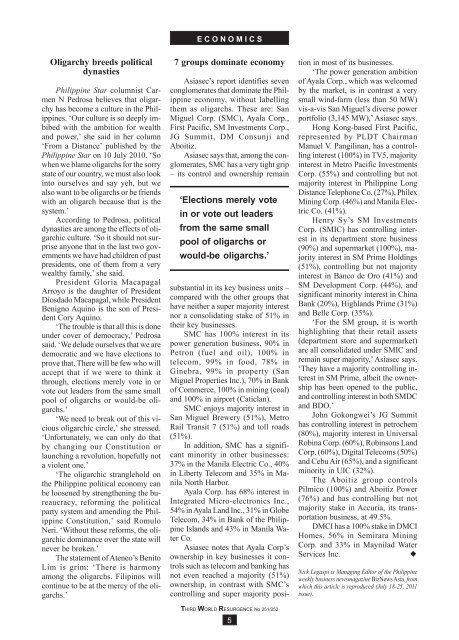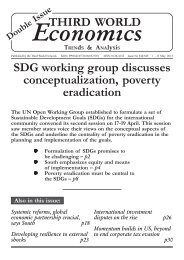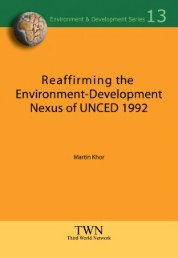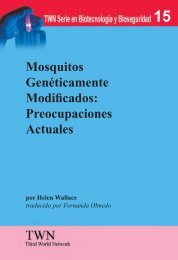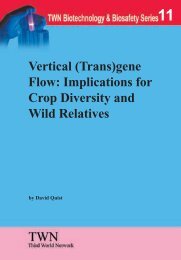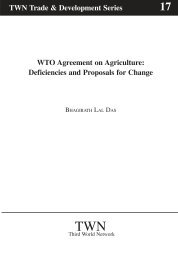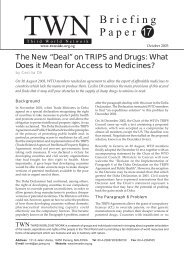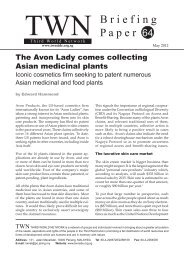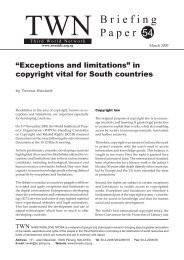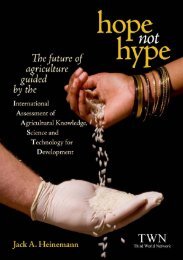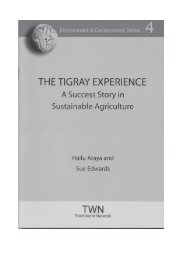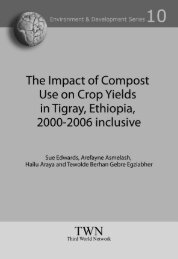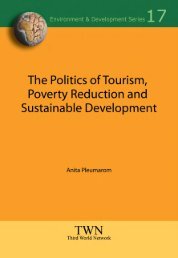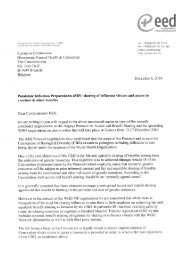The Editors - Third World Network
The Editors - Third World Network
The Editors - Third World Network
You also want an ePaper? Increase the reach of your titles
YUMPU automatically turns print PDFs into web optimized ePapers that Google loves.
E C O N O M I C S<br />
Oligarchy breeds political<br />
dynasties<br />
Philippine Star columnist Carmen<br />
N Pedrosa believes that oligarchy<br />
has become a culture in the Philippines.<br />
‘Our culture is so deeply imbibed<br />
with the ambition for wealth<br />
and power,’ she said in her column<br />
‘From a Distance’ published by the<br />
Philippine Star on 10 July 2010. ‘So<br />
when we blame oligarchs for the sorry<br />
state of our country, we must also look<br />
into ourselves and say yeh, but we<br />
also want to be oligarchs or be friends<br />
with an oligarch because that is the<br />
system.’<br />
According to Pedrosa, political<br />
dynasties are among the effects of oligarchic<br />
culture. ‘So it should not surprise<br />
anyone that in the last two governments<br />
we have had children of past<br />
presidents, one of them from a very<br />
wealthy family,’ she said.<br />
President Gloria Macapagal<br />
Arroyo is the daughter of President<br />
Diosdado Macapagal, while President<br />
Benigno Aquino is the son of President<br />
Cory Aquino.<br />
‘<strong>The</strong> trouble is that all this is done<br />
under cover of democracy,’ Pedrosa<br />
said. ‘We delude ourselves that we are<br />
democratic and we have elections to<br />
prove that. <strong>The</strong>re will be few who will<br />
accept that if we were to think it<br />
through, elections merely vote in or<br />
vote out leaders from the same small<br />
pool of oligarchs or would-be oligarchs.’<br />
‘We need to break out of this vicious<br />
oligarchic circle,’ she stressed.<br />
‘Unfortunately, we can only do that<br />
by changing our Constitution or<br />
launching a revolution, hopefully not<br />
a violent one.’<br />
‘<strong>The</strong> oligarchic stranglehold on<br />
the Philippine political economy can<br />
be loosened by strengthening the bureaucracy,<br />
reforming the political<br />
party system and amending the Philippine<br />
Constitution,’ said Romulo<br />
Neri. ‘Without these reforms, the oligarchic<br />
dominance over the state will<br />
never be broken.’<br />
<strong>The</strong> statement of Ateneo’s Benito<br />
Lim is grim: ‘<strong>The</strong>re is harmony<br />
among the oligarchs. Filipinos will<br />
continue to be at the mercy of the oligarchs.’<br />
7 groups dominate economy<br />
Asiasec’s report identifies seven<br />
conglomerates that dominate the Philippine<br />
economy, without labelling<br />
them as oligarchs. <strong>The</strong>se are: San<br />
Miguel Corp. (SMC), Ayala Corp.,<br />
First Pacific, SM Investments Corp.,<br />
JG Summit, DM Consunji and<br />
Aboitiz.<br />
Asiasec says that, among the conglomerates,<br />
SMC has a very tight grip<br />
– its control and ownership remain<br />
‘Elections merely vote<br />
in or vote out leaders<br />
from the same small<br />
pool of oligarchs or<br />
would-be oligarchs.’<br />
substantial in its key business units –<br />
compared with the other groups that<br />
have neither a super majority interest<br />
nor a consolidating stake of 51% in<br />
their key businesses.<br />
SMC has 100% interest in its<br />
power generation business, 90% in<br />
Petron (fuel and oil), 100% in<br />
telecom, 99% in food, 78% in<br />
Ginebra, 99% in property (San<br />
Miguel Properties Inc.), 70% in Bank<br />
of Commerce, 100% in mining (coal)<br />
and 100% in airport (Caticlan).<br />
SMC enjoys majority interest in<br />
San Miguel Brewery (51%), Metro<br />
Rail Transit 7 (51%) and toll roads<br />
(51%).<br />
In addition, SMC has a significant<br />
minority in other businesses:<br />
37% in the Manila Electric Co., 40%<br />
in Liberty Telecom and 35% in Manila<br />
North Harbor.<br />
Ayala Corp. has 68% interest in<br />
Integrated Micro-electronics Inc.,<br />
54% in Ayala Land Inc., 31% in Globe<br />
Telecom, 34% in Bank of the Philippine<br />
Islands and 43% in Manila Water<br />
Co.<br />
Asiasec notes that Ayala Corp’s<br />
ownership in key businesses it controls<br />
such as telecom and banking has<br />
not even reached a majority (51%)<br />
ownership, in contrast with SMC’s<br />
controlling and super majority posi-<br />
THIRD WORLD RESURGENCE No 251/252<br />
5<br />
tion in most of its businesses.<br />
‘<strong>The</strong> power generation ambition<br />
of Ayala Corp., which was welcomed<br />
by the market, is in contrast a very<br />
small wind-farm (less than 50 MW)<br />
vis-a-vis San Miguel’s diverse power<br />
portfolio (3,145 MW),’ Asiasec says.<br />
Hong Kong-based First Pacific,<br />
represented by PLDT Chairman<br />
Manuel V. Pangilinan, has a controlling<br />
interest (100%) in TV5, majority<br />
interest in Metro Pacific Investments<br />
Corp. (55%) and controlling but not<br />
majority interest in Philippine Long<br />
Distance Telephone Co. (27%), Philex<br />
Mining Corp. (46%) and Manila Electric<br />
Co. (41%).<br />
Henry Sy’s SM Investments<br />
Corp. (SMIC) has controlling interest<br />
in its department store business<br />
(90%) and supermarket (100%), majority<br />
interest in SM Prime Holdings<br />
(51%), controlling but not majority<br />
interest in Banco de Oro (41%) and<br />
SM Development Corp. (44%), and<br />
significant minority interest in China<br />
Bank (20%), Highlands Prime (31%)<br />
and Belle Corp. (35%).<br />
‘For the SM group, it is worth<br />
highlighting that their retail assets<br />
(department store and supermarket)<br />
are all consolidated under SMIC and<br />
remain super majority,’ Asiasec says.<br />
‘<strong>The</strong>y have a majority controlling interest<br />
in SM Prime, albeit the ownership<br />
has been opened to the public,<br />
and controlling interest in both SMDC<br />
and BDO.’<br />
John Gokongwei’s JG Summit<br />
has controlling interest in petrochem<br />
(80%), majority interest in Universal<br />
Robina Corp. (60%), Robinsons Land<br />
Corp. (60%), Digital Telecoms (50%)<br />
and Cebu Air (65%), and a significant<br />
minority in UIC (32%).<br />
<strong>The</strong> Aboitiz group controls<br />
Pilmico (100%) and Aboitiz Power<br />
(76%) and has controlling but not<br />
majority stake in Accuria, its transportation<br />
business, at 49.5%.<br />
DMCI has a 100% stake in DMCI<br />
Homes, 56% in Semirara Mining<br />
Corp. and 33% in Maynilad Water<br />
Services Inc.<br />
ÿu<br />
Nick Legaspi is Managing Editor of the Philippine<br />
weekly business newsmagazine BizNews Asia, from<br />
which this article is reproduced (July 18-25, 2011<br />
issue).


